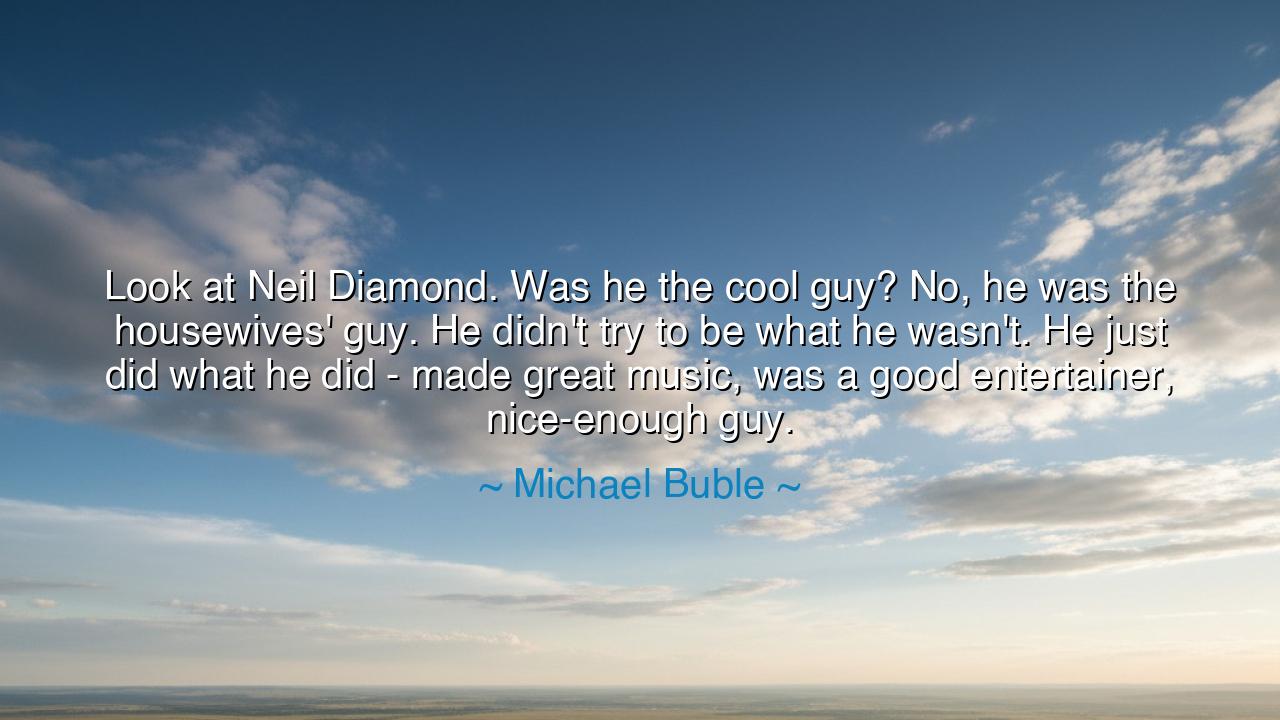
Look at Neil Diamond. Was he the cool guy? No, he was the
Look at Neil Diamond. Was he the cool guy? No, he was the housewives' guy. He didn't try to be what he wasn't. He just did what he did - made great music, was a good entertainer, nice-enough guy.






“Look at Neil Diamond. Was he the cool guy? No, he was the housewives’ guy. He didn’t try to be what he wasn’t. He just did what he did—made great music, was a good entertainer, nice-enough guy.” Thus spoke Michael Bublé, the crooner of the modern age, whose smooth voice carries not only melody but meaning. Beneath his words lies a truth older than the stars of fame and fortune themselves: that authenticity is the truest form of greatness. In a world forever chasing trends and illusions of “cool,” Bublé points to the humble power of the man who knew himself and stood firm in it—Neil Diamond, the singer who, without pretense, conquered hearts by being precisely who he was.
The origin of this quote comes from Bublé’s reflections on artistry and identity. As a performer himself—often compared to legends of earlier generations—he understands the temptation to craft an image, to bend one’s soul toward what the world demands. Yet in Neil Diamond, he sees a beacon of integrity: a man who did not bow to the winds of fashion, who did not chase the fickle approval of critics or crowds. Diamond was not “cool” by the standards of his time—he was not rebellious, nor detached, nor adorned in the armor of irony. But he possessed something greater: the courage to be sincere. His songs—simple, melodic, heartfelt—spoke to millions not because they were fashionable, but because they were true.
In this reflection, Bublé offers a subtle but profound teaching on the nature of art and selfhood. To “be cool” is to seek approval; to “be real” is to seek truth. Many chase the former and lose themselves in the process. Few pursue the latter and find not only themselves, but the hearts of others. Neil Diamond did not pretend to be a rebel when he was a romantic; he did not disguise his warmth with irony. He embraced his nature, and through that authenticity, became immortal. Bublé, in recognizing this, reminds us that genuineness—not popularity—is the mark of the truly enduring artist, and indeed, the truly enduring soul.
History has echoed this lesson through countless lives. Consider Socrates, the philosopher who refused to flatter Athens with the answers it wanted to hear. When accused of corrupting the youth, he could have softened his speech, aligned himself with the “cool” voices of the age—but he did not. He remained steadfast in his conviction to seek wisdom, not applause. Like Diamond, Socrates did what he believed was right, even when the world mocked him. And though Athens silenced him, history has not. The authentic spirit outlives the judgment of its own time.
Bublé’s words also speak to a deeper truth about integrity in creation. Whether one builds songs, nations, or legacies, the impulse to imitate others can be seductive. The world applauds novelty, but it forgets quickly. The works that endure—be they cathedrals or melodies—are built not upon the shifting sands of approval, but upon the rock of sincerity. Neil Diamond’s music, with its unabashed earnestness—songs like Sweet Caroline or I Am... I Said—was sometimes dismissed by those chasing edgier sounds. Yet decades later, those very songs remain sung, cherished, remembered. For the soul knows how to recognize truth in art, even when the mind resists it.
And there is wisdom, too, in the gentleness of Diamond’s example. Bublé calls him a “nice-enough guy,” a phrase that seems modest, but in truth, it carries power. In a culture that prizes arrogance and spectacle, kindness has become a forgotten art. Diamond’s decency, his warmth toward his audience, his humility despite fame—these were not weaknesses, but strengths. They revealed the quiet confidence of one who did not need to perform his identity, for he had already found it. It is a rare soul who can stand before the world and say: I am enough as I am.
So, my listener, take this as your lesson: do not seek to be “cool.” Seek instead to be true. The world’s admiration is a breeze that changes direction with the hour, but authenticity endures like stone. Whether you are an artist, a leader, or simply a soul walking through this brief life, do not twist yourself to fit the mold of others. Know who you are, and be it without apology. The path of authenticity may not glitter, but it shines from within, and that light can outlast empires.
And as Michael Bublé reminds us through his reverence for Neil Diamond, it is not the image you craft that defines you, but the heart you reveal. Do your work with honesty. Be kind. Create not what is fashionable, but what is faithful to your spirit. For the cool will fade, but the real will remain—like a song that, though simple, carries on the wind of time, and is sung forever in the hearts of those who hear it.






AAdministratorAdministrator
Welcome, honored guests. Please leave a comment, we will respond soon